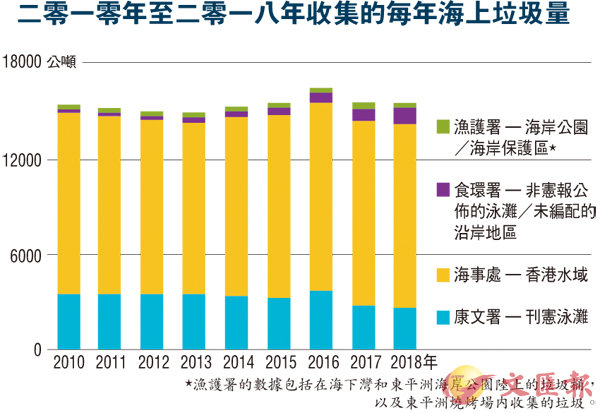
More than 30 years later, there may be more 'glue' than fish
Hong Kong has many beautiful bays in both urban and suburban areas, but the exhaust gas and marine garbage from ships and roadside vehicles have destroyed the pleasant scenery and turned the bay into a garbage Bay. According to the Marine Department, Southern District is one of the hardest hit areas, and environmental protection organizations found a large number of plastic waste on Lamma Island opposite Aberdeen. In fact, EPD research shows that 80% of Hong Kong's marine garbage comes from land, and plastic alone accounts for 70% of marine garbage. Xie zhanhuan, deputy director of the environment bureau, said in an exclusive interview with Hong Kong Wen Wei Po that plastic waste is difficult to decompose, and the harm of glue is far-reaching. The government is studying the phasing out of disposable plastic tableware, and the research results are expected to be published next year.
■Hong Kong Wen Wei Po reporter Nie Xiaohui
Zhang Jieyi, conservation policy director of WWF Hong Kong Branch, pointed out in an exclusive interview with Hong Kong Wen Wei Po that the world is facing the problem of marine garbage, especially in Asia. Hong Kong is located by the sea, which is even more difficult to escape. The foundation pointed out, for example, that the Aberdeen typhoon shelter was one of the garbage black spots. The styrofoam boxes used in the fish market in this area fell into the sea for various reasons and rushed to nearby places. The foundation once found a large number of styrofoam fragments hidden in the sand when cleaning up marine garbage in Beijiao village, Lamma Island, opposite Aberdeen (see another draft).
Land garbage pollutes the sea
Xie zhanhuan said in an exclusive interview with Hong Kong Wen Wei Po that a survey conducted by the environmental protection department in 2013 also found that 80% of marine garbage came from land. Overall, 70% of garbage is plastic, including a large number of tableware and lunch boxes. In recent years, the world has discussed the prohibition or elimination of plastic, and Hong Kong people have also begun to pay attention to 'plastic walking'. The wood, metal, glass and other products we see everyday are natural things, but plastic is completely man-made and difficult to decompose. About 8million tons of plastic waste are poured into the global ocean every year. According to research, it is estimated that by 2050, its quantity will be more than that of fish in the ocean! '
As for the garbage problem in the area of Aberdeen typhoon shelter, Xie zhanhuan refers to the styrofoam containers used in fishing transportation. WWF applied for funding from the environmental protection and Conservation Fund of the environmental protection department to use environmentally friendly containers for fisheries research. The environmental protection department and the fish marketing organization also set up fences on the shore of the fish market to prevent styrofoam from falling into the sea, and also added styrofoam compressors (see another draft).
He added that in fact, only a small amount of marine garbage from land flows into the sea through storm drains. 'The Drainage Services Department has set up a Seine at the outlet of the sea channel to intercept the garbage from the upstream, but in fact, the amount is not too much, (Marine garbage) is mainly caused by shore activities.'
At the same time, the sewers of some buildings may be connected to storm drains by mistake, and household waste and sewage may rush into the sea. The Drainage Services Department has installed dry season interceptors in many areas to block and divert the polluted dry streams of storm drains to the sewage collection system to reduce odor.
Xie zhanhuan said that the inter departmental working group on marine environmental management set up by the government has strengthened the cleaning of coastal garbage before the typhoon, and set up an online platform to immediately contact social groups and regional organizations to clean up garbage after the typhoon.
Practice the key of waste reduction
He stressed that the general awareness and attention of Hong Kong people on the problem of dealing with the root causes of waste have increased compared with the previous years, and the problem only lies in how many people 'practice' it. He pointed out, for example, that before the implementation of plastic bags, only 1 or 2 people per 10 people brought their own shopping bags. Now the ratio of self owned shopping bags has increased to about 90%, 'even if some people's starting point is to pay an extra 0.5 yuan to the government, it's no problem. The most important thing is the result, because the most difficult thing is to change the behavior mode, and we must continue to educate, and so is the problem of' plastic walking '
Article links:http://paper.wenweipo.com/2019/04/14/HK1904140001.htm